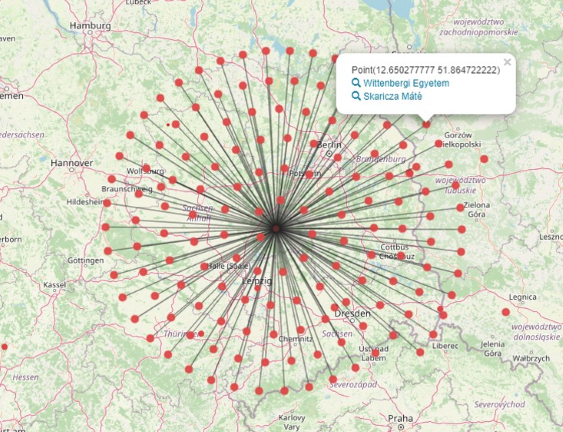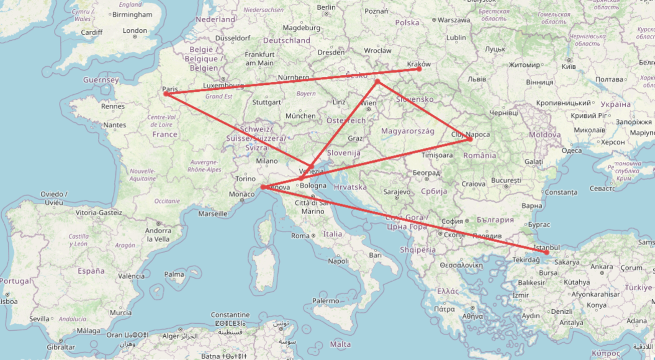Difference between revisions of "HECE"
(szerkesztés) |
(szerkesztés) |
||
| Line 33: | Line 33: | ||
== Humanism in East-Central Europe Research Group == | == Humanism in East-Central Europe Research Group == | ||
| + | |||
This research project led by Farkas Gábor Kiss aims at creating a center of expertise for the history of scholarly networks in the early modern Europe, a period traditionally described as one of great cultural discontinuity and renewal. By reconstructing the communication process between Hungary and the rest of Europe in the early modern age with digital tools, and by examining important agents of knowledge (including Johannes Sambucus, György Enyedi, János Apáczai Csere), the project aims at challenging stereotypical descriptions of the European „center and periphery” and it will cast new light on themes of central relevance in the pre-modern world. The central research aim of the team will be to prepare and edit an English-language encyclopedia of humanistic authors and works from the historical Kingdom of Hungary in the period between 1420 and 1620, which will be published as a volume of the prestigious Verfasserlexikon series. | This research project led by Farkas Gábor Kiss aims at creating a center of expertise for the history of scholarly networks in the early modern Europe, a period traditionally described as one of great cultural discontinuity and renewal. By reconstructing the communication process between Hungary and the rest of Europe in the early modern age with digital tools, and by examining important agents of knowledge (including Johannes Sambucus, György Enyedi, János Apáczai Csere), the project aims at challenging stereotypical descriptions of the European „center and periphery” and it will cast new light on themes of central relevance in the pre-modern world. The central research aim of the team will be to prepare and edit an English-language encyclopedia of humanistic authors and works from the historical Kingdom of Hungary in the period between 1420 and 1620, which will be published as a volume of the prestigious Verfasserlexikon series. | ||
| + | |||
| + | In a framework of a collaboration with the Department of Digital Humanities (ELTE), HECE-lexicon became the first collection in the semantic database. Currently the prosopography and the bibliography are available and searchable. By means of the visualizations of SPARQL semantic query language, it is possible to present the queries' results on maps or diverse diagrams. | ||
Records of HECEdata are available [https://tinyurl.com/2gxbjwuu '''here''']. | Records of HECEdata are available [https://tinyurl.com/2gxbjwuu '''here''']. | ||
| + | |||
| + | [[File:HECE map.png|thumb|Visualization of peregrinations (Detail)]] | ||
'''Queries, data visualizationsː''' | '''Queries, data visualizationsː''' | ||
| Line 49: | Line 54: | ||
• [https://tinyurl.com/26vxt8yr The most quoted bibliographical records in HECEdata] | • [https://tinyurl.com/26vxt8yr The most quoted bibliographical records in HECEdata] | ||
| − | • [https://tinyurl.com/28ky9vyc Familial relationships in HECEdata] | + | • [https://tinyurl.com/28ky9vyc Familial relationships in HECEdata][[File:HECE map 2.png|thumb|Visualization of travels, residences]] |
| + | |||
| + | |||
| + | |||
| + | |||
The person responsible for the projectː [[Item:Q18481|Ádám Sebestyén]] | The person responsible for the projectː [[Item:Q18481|Ádám Sebestyén]] | ||
Latest revision as of 13:57, 18 July 2023
MTA-ELTE, HUMANIZMUS KELET-KÖZÉP-EURÓPÁBAN LENDÜLET KUTATÓCSOPORT, TÖRTÉNETI ÉRTELMISÉGI HÁLÓZATOK
A HECE-kutatócsoport az MTA Lendület-pályázatának támogatásával az 1420 és 1620 között a Magyar Királyság területén született irodalmi műveket és szerzőik értelmiségi karriermintázatait vizsgálja. A projekt fő célkitűzése egy angol nyelvű, a német Verfasserlexikon mintáját követő lexikon megjelentetése, amely az 1420 és 1620 között Magyarországon élt, mintegy 400-450, munkásságát latin vagy klasszikus mintákat követő népnyelven folytató szerző szövegeit, szöveghagyományát mutatja be. Ez a szöveg- és értelmiségtörténeti kutatás nyújt alapot a korabeli értelmiségi életpályák nyelvi, konfesszionális, szociológiai és karriermintázatainak feltérképezéséhez. A kutatás az eddigi összefoglalásokhoz képest új megközelítésben vizsgálja a műveket: alapvetően nem az alkotókat helyezi a kutatások középpontjába, hanem a szövegek kontextusát és materiális fennmaradását, különös tekintettel arra, hogy egy-egy szerző művei hol és milyen formában, kéziratban vagy nyomtatásban maradtak-e fenn, hogyan olvasták korabeli olvasói, és ennek milyen emlékei vannak.
A Digitális Bölcsészet Tanszékkel folytatott együttműködés keretében az ELTEdata első, szemantikus alapokon feldolgozott gyűjteménye a HECE-lexikon. Jelenleg a prozopográfiai rész, valamint a bibliográfia hozzáférhető és kereshető. A SPARQL szemantikus lekérdező nyelv vizualizációnak köszönhetően lehetőség van a keresések eredményeit akár térképre vetítve, akár különböző diagramokba rendezve megjeleníteni.
A HECEdata rekordjai elérhetőek itt.
Lekérdezések, adatvizualizációk
• Települések, ahol reformátusok egyházi vagy világi tisztséget töltöttek be
• Felekezeti megoszlás a HECEdatában
• A HECEdata legtöbbet idézett bibliográfiai rekordjai
• Családi és rokoni kapcsolatok a HECEdatában
A projekt szakmai felelőseː Sebestyén Ádám
Humanism in East-Central Europe Research Group
This research project led by Farkas Gábor Kiss aims at creating a center of expertise for the history of scholarly networks in the early modern Europe, a period traditionally described as one of great cultural discontinuity and renewal. By reconstructing the communication process between Hungary and the rest of Europe in the early modern age with digital tools, and by examining important agents of knowledge (including Johannes Sambucus, György Enyedi, János Apáczai Csere), the project aims at challenging stereotypical descriptions of the European „center and periphery” and it will cast new light on themes of central relevance in the pre-modern world. The central research aim of the team will be to prepare and edit an English-language encyclopedia of humanistic authors and works from the historical Kingdom of Hungary in the period between 1420 and 1620, which will be published as a volume of the prestigious Verfasserlexikon series.
In a framework of a collaboration with the Department of Digital Humanities (ELTE), HECE-lexicon became the first collection in the semantic database. Currently the prosopography and the bibliography are available and searchable. By means of the visualizations of SPARQL semantic query language, it is possible to present the queries' results on maps or diverse diagrams.
Records of HECEdata are available here.
Queries, data visualizationsː
• Peregrination of humanist authors
• Settlements where Calvinist held secular of ecclesiastical positions
• The most quoted bibliographical records in HECEdata
• Familial relationships in HECEdata
The person responsible for the projectː Ádám Sebestyén



